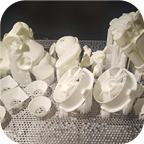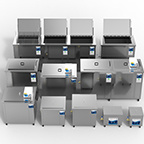Can You Safely Use Ultrasonic Cleaners for Dentures and Retainers?
Browse Volume:164 Classify:Support
There’s something undeniably appealing about having a spotless set of dentures or a gleaming retainer tray—all achieved without scrubbing. That’s the magic ultrasonic cleaners seem to promise. These compact devices, often no larger than a lunchbox, claim to blast away food particles, plaque, and stains with nothing more than high-frequency sound waves and a splash of water. But if you’ve ever wondered whether it’s really safe—or even effective—to use one at home for cleaning your dental appliances, you’re far from alone.
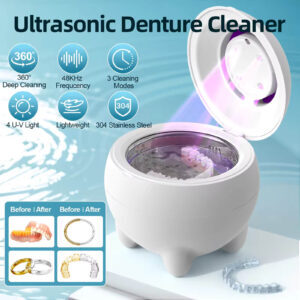
Ultrasonic Denture cleaner
Let’s explore what ultrasonic cleaning actually means for dentures and retainers, where the true benefits lie, and what pitfalls to avoid.
What Are Ultrasonic Cleaners and How Do They Work?
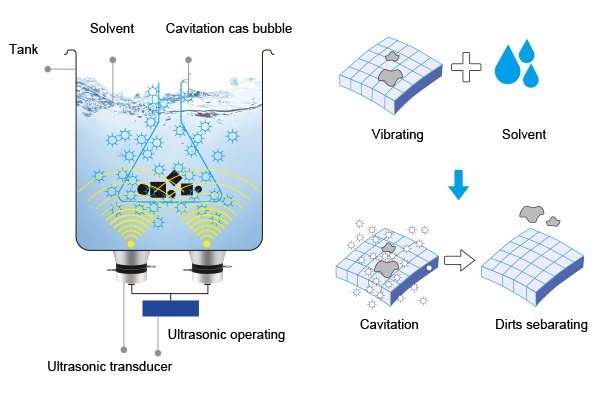
Diagram of the Working Principle of an Ultrasonic Cleaner
Ultrasonic cleaners use high-frequency sound waves—typically between 20,000 and 40,000 Hz—to create microscopic cavitation bubbles in a cleaning liquid. When these bubbles implode, they dislodge debris from even the tiniest crevices. In a professional dental setting, ultrasonic cleaning is used to sterilize instruments. But at-home devices, while less powerful, are increasingly marketed for cleaning things like night guards, Invisalign trays, traditional retainers, and full or partial dentures.
Why Are People Turning to Ultrasonic Cleaning at Home?
Traditional cleaning methods for dentures and retainers—like soaking them in fizzy tablets or brushing them with a soft toothbrush—still work, but they take time and can be inconsistent. Missed grooves or hidden buildup isn’t uncommon. Ultrasonic cleaners, on the other hand, appeal to those who want a deep clean without the manual effort. They’re also marketed as being more hygienic, with the promise of removing bacteria you can’t see.
Another big reason? Convenience. Pop the appliance in the tank, press a button, and walk away. No scrubbing. No fuss. It’s easy to see why people might be tempted to buy one.
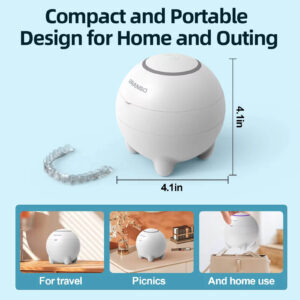
Compact and Portable
Design for Home and Outing
Are Ultrasonic Cleaners Safe for Dentures and Retainers?
Generally speaking, yes—when used appropriately. Most dentists agree that ultrasonic cleaners are safe for cleaning hard acrylic dentures and plastic retainers. In fact, a 2021 study in Gerodontology found ultrasonic cleaning to be more effective than manual brushing alone at reducing bacterial biofilm on dentures.
But there are some caveats. Soft relining materials, common in certain denture bases, can degrade faster under ultrasonic vibration. Similarly, metal clasps on partial dentures might loosen slightly over time if exposed to strong ultrasonic waves too frequently. It’s all about moderation and using devices with the right frequency and cleaning solution.
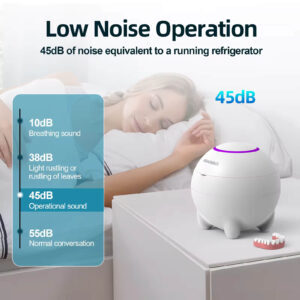
Low Noise Operation
45dB of noise equivalent to a running refrigerator
Choosing the Right Cleaning Solution Matters
The liquid you use inside the tank can significantly affect both safety and cleaning results. Tap water is the base, but a mild, non-abrasive cleaning solution formulated for dentures or dental appliances improves effectiveness. Avoid harsh chemicals like bleach or alcohol-based products, which can damage the plastic and metal over time.
Also, it’s worth noting that overly hot water can warp thermoplastic retainers or trays. So if your ultrasonic cleaner has a heating function, make sure it’s adjustable—or better yet, stick to room-temperature water unless your appliance’s manufacturer says otherwise.
Potential Risks and How to Avoid Them
The main risks come from misuse or overuse. For example, running the cleaner for too long, using abrasive solutions, or cleaning appliances with cracks or loose parts can accelerate wear. There’s also the human factor: someone might assume their device makes brushing obsolete. That’s not the case.
Dentists still recommend brushing dentures gently once a day to remove loose debris and rinsing them after meals. Ultrasonic cleaners are best seen as a supplementary tool—not a complete replacement for basic hygiene.
It’s also smart to inspect your dental appliance regularly. If you notice discoloration, changes in fit, or material degradation, consult your dentist. Even the best cleaning won’t save an ill-fitting or worn-out denture.
So Who Should Use Ultrasonic Cleaners—and How Often?
If you wear retainers nightly, or if you rely on a full or partial denture daily, then a once-a-day ultrasonic cleaning can be beneficial—especially if you’re prone to plaque buildup or have a compromised immune system. For others, two to three times a week might be more than enough.
If you’re considering a device, choose one from a reputable manufacturer, ideally one recommended by dental professionals. Look for features like a stainless steel tank, auto shut-off, and adjustable timer settings.
Final Thoughts
Ultrasonic cleaners aren’t magic boxes—but they are smart additions to your dental care routine when used correctly. They offer deep cleaning in hard-to-reach areas, reduce microbial buildup, and simplify what can otherwise be a tedious chore. Just be sure to use the right solutions, limit run times, and treat them as a helpful supplement—not a substitute—for other care habits.
With the right approach, these devices can become reliable allies in keeping your dentures, retainers, and other appliances clean, fresh, and safe for daily wear.
 Granbo Sonic
Granbo Sonic









